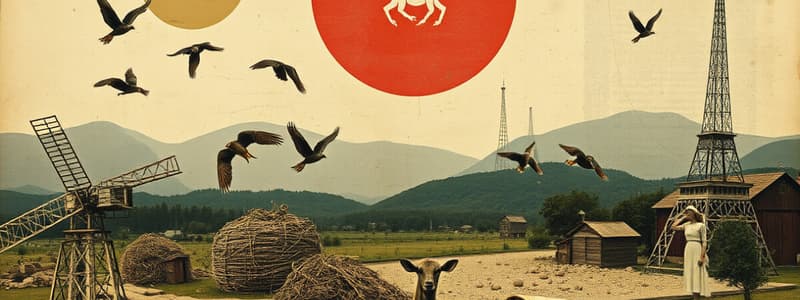Podcast
Questions and Answers
What is the social science that studies the production, distribution, and consumption of goods and services?
What is the social science that studies the production, distribution, and consumption of goods and services?
Economics
What is a condition that exists when there are not enough resources to satisfy all of the competing uses?
What is a condition that exists when there are not enough resources to satisfy all of the competing uses?
Scarcity
What are the four different categories economists classify resources?
What are the four different categories economists classify resources?
Labor, land, capital, entrepreneurship
What term describes the physical and mental effort people use to produce goods and services?
What term describes the physical and mental effort people use to produce goods and services?
What includes all natural resources such as timber, water, oil, minerals, and plants?
What includes all natural resources such as timber, water, oil, minerals, and plants?
What term refers to goods or money that is used to invest in order to make income?
What term refers to goods or money that is used to invest in order to make income?
What do we call someone who undertakes an activity or enterprise?
What do we call someone who undertakes an activity or enterprise?
What do we use to produce goods and services; also called factors of production?
What do we use to produce goods and services; also called factors of production?
What is the study of how individuals, households, and businesses make choices about the production, allocation, and consumption of scarce resources?
What is the study of how individuals, households, and businesses make choices about the production, allocation, and consumption of scarce resources?
What is the study of the economy as a whole called?
What is the study of the economy as a whole called?
What is the value of the best alternative given up known as?
What is the value of the best alternative given up known as?
What do we call it when you give up something in order to gain something else?
What do we call it when you give up something in order to gain something else?
What are amounts of money spent on the inputs used in the production process called?
What are amounts of money spent on the inputs used in the production process called?
What are costs that affect an entire operation, rather than a specific product or service called?
What are costs that affect an entire operation, rather than a specific product or service called?
What is an action that results in an outcome that was not intended?
What is an action that results in an outcome that was not intended?
What do we call it when an action has unexpected benefits?
What do we call it when an action has unexpected benefits?
What term describes an action that causes unexpected harm or has unexpected costs?
What term describes an action that causes unexpected harm or has unexpected costs?
Who wrote the Wealth of Nations in 1776?
Who wrote the Wealth of Nations in 1776?
What did Adam Smith argue?
What did Adam Smith argue?
What involves doing a little more of something or doing a little less of something?
What involves doing a little more of something or doing a little less of something?
What is the additional benefit or change in total benefit resulting from an action called?
What is the additional benefit or change in total benefit resulting from an action called?
What is the cost of each additional unit of a good?
What is the cost of each additional unit of a good?
What is the total cost of production divided by the number of units produced?
What is the total cost of production divided by the number of units produced?
What are the three basic economic questions?
What are the three basic economic questions?
What is an economy in which the kind of work people do and the goods people produce is followed by tradition and custom called?
What is an economy in which the kind of work people do and the goods people produce is followed by tradition and custom called?
What is an economy where the government makes all or most of the economic decisions?
What is an economy where the government makes all or most of the economic decisions?
What is an economy in which consumers decide what will be produced by purchasing what they prefer?
What is an economy in which consumers decide what will be produced by purchasing what they prefer?
What is an economy in which several different models coexist, such as a market economy and a command economy?
What is an economy in which several different models coexist, such as a market economy and a command economy?
What is an overall increase in the price level?
What is an overall increase in the price level?
What is a thing or idea that is used to encourage or discourage people from making certain decisions?
What is a thing or idea that is used to encourage or discourage people from making certain decisions?
What is the concept that individuals are allowed to own property and use it in any legal way they see fit?
What is the concept that individuals are allowed to own property and use it in any legal way they see fit?
What is the creation or manufacture of goods and services for sale with exchange value called?
What is the creation or manufacture of goods and services for sale with exchange value called?
What is the step in the production process that brings the goods and services from those who make them to those who use them?
What is the step in the production process that brings the goods and services from those who make them to those who use them?
What is the act of acquiring goods or services for direct use called?
What is the act of acquiring goods or services for direct use called?
Who is considered the 'father of modern economics'?
Who is considered the 'father of modern economics'?
Where have Adam Smith's concepts been written?
Where have Adam Smith's concepts been written?
What is a metaphor used by philosopher and economist Adam Smith that describes how people acting in their self-interest can lead to socially desirable outcomes?
What is a metaphor used by philosopher and economist Adam Smith that describes how people acting in their self-interest can lead to socially desirable outcomes?
What are the productive resources used to produce goods and services called?
What are the productive resources used to produce goods and services called?
What are the man-made goods, such as tools, which are used to produce other goods called?
What are the man-made goods, such as tools, which are used to produce other goods called?
What refers to the skills, abilities, and ideas learned over time in preparation for a job?
What refers to the skills, abilities, and ideas learned over time in preparation for a job?
Flashcards
Economics
Economics
The social science studying production, distribution, and consumption of goods and services.
Scarcity
Scarcity
A condition where resources are insufficient to meet competing needs.
Resources
Resources
Factors classified into labor, land, capital, and entrepreneurship used in production.
Labor
Labor
Signup and view all the flashcards
Land
Land
Signup and view all the flashcards
Capital
Capital
Signup and view all the flashcards
Entrepreneurship
Entrepreneurship
Signup and view all the flashcards
Microeconomics
Microeconomics
Signup and view all the flashcards
Macroeconomics
Macroeconomics
Signup and view all the flashcards
Opportunity Cost
Opportunity Cost
Signup and view all the flashcards
Trade-off
Trade-off
Signup and view all the flashcards
Marginal Decisions
Marginal Decisions
Signup and view all the flashcards
Direct Costs
Direct Costs
Signup and view all the flashcards
Indirect Costs
Indirect Costs
Signup and view all the flashcards
Marginal Cost
Marginal Cost
Signup and view all the flashcards
Average Cost
Average Cost
Signup and view all the flashcards
Basic Economic Questions
Basic Economic Questions
Signup and view all the flashcards
Traditional Economy
Traditional Economy
Signup and view all the flashcards
Command Economy
Command Economy
Signup and view all the flashcards
Market Economy
Market Economy
Signup and view all the flashcards
Mixed Economy
Mixed Economy
Signup and view all the flashcards
Inflation
Inflation
Signup and view all the flashcards
Incentives
Incentives
Signup and view all the flashcards
Private Ownership
Private Ownership
Signup and view all the flashcards
Production
Production
Signup and view all the flashcards
Distribution
Distribution
Signup and view all the flashcards
Consumption
Consumption
Signup and view all the flashcards
Adam Smith
Adam Smith
Signup and view all the flashcards
Invisible Hand
Invisible Hand
Signup and view all the flashcards
Physical Capital
Physical Capital
Signup and view all the flashcards
Human Capital
Human Capital
Signup and view all the flashcards
Study Notes
Introduction to Economics
- Economics is the social science that examines the production, distribution, and consumption of goods and services.
- It studies how individuals, businesses, and governments make choices about resource allocation.
Key Economic Concepts
- Scarcity: A condition where resources are insufficient to meet all competing needs.
- Resources: Classified into four categories: labor, land, capital, and entrepreneurship.
Types of Resources
- Labor: The physical and mental efforts used in the production of goods and services.
- Land: Natural resources such as timber, water, minerals, and other gifts from the earth.
- Capital: Goods used to produce other goods; includes tools, machinery, and infrastructure.
- Entrepreneurship: The initiative taken by individuals to undertake business activities.
Economic Branches
- Microeconomics: Focuses on individual and business choices regarding production and resource allocation.
- Macroeconomics: Studies the economy as a whole, including national income and overall economic growth.
Decision-Making in Economics
- Opportunity Cost: Value of the best alternative forgone when making a decision.
- Trade-off: Sacrificing one thing to gain another, emphasizing the need for choices.
- Marginal Decisions: Involves making incremental changes to increase or decrease production or consumption.
Costs of Production
- Direct Costs: Expenses directly tied to the production process.
- Indirect Costs: Expenses that affect the entire operation rather than specific products.
- Marginal Cost: The cost incurred by producing one more unit of a good.
- Average Cost: Total production costs divided by the number of units produced.
Basic Economic Questions
- The three fundamental questions an economy must address:
- What should be produced?
- How much should be produced?
- Who will purchase the goods or services?
Economic Systems
- Traditional Economy: Economic decisions based on customs and traditions.
- Command Economy: The government makes most economic decisions.
- Market Economy: Decisions driven by consumer preferences and supply-demand dynamics.
- Mixed Economy: Combines elements of market and command economies.
Economic Indicators
- Inflation: A sustained increase in the overall price level of goods and services.
- Incentives: Factors that motivate individuals to make certain decisions.
Economic Foundations
- Private Ownership: The right of individuals to own property and use it legally as they deem fit.
- Production: The process of creating goods and services with exchange value.
- Distribution: Sharing goods and services from producers to consumers.
- Consumption: Acquiring goods for direct use rather than for resale.
Influential Economists
- Adam Smith: Known as the "father of modern economics," authored "Wealth of Nations" in 1776.
- Invisible Hand: A concept by Adam Smith suggesting that self-interest leads individuals to contribute to overall societal well-being.
Capital Forms
- Physical Capital: Man-made goods used in the production of other goods.
- Human Capital: Skills and knowledge acquired by individuals to enhance their labor effectiveness.
Conclusion
- Understanding these key concepts and terms enhances comprehension of basic economic principles and the functioning of economies on a micro and macro level.
Studying That Suits You
Use AI to generate personalized quizzes and flashcards to suit your learning preferences.




